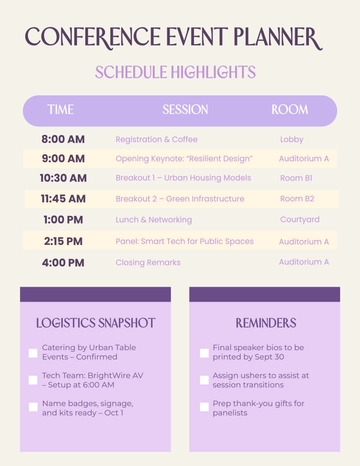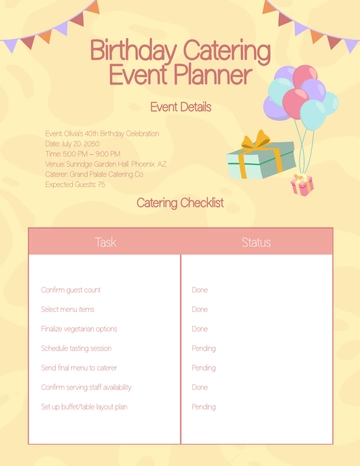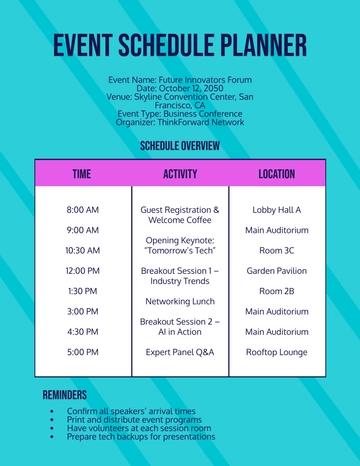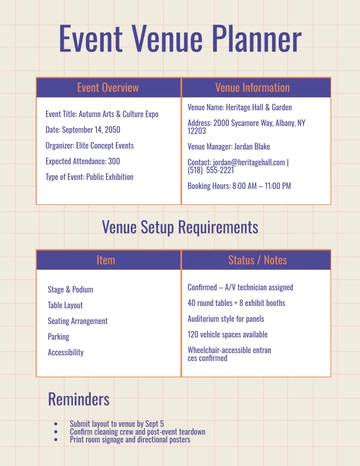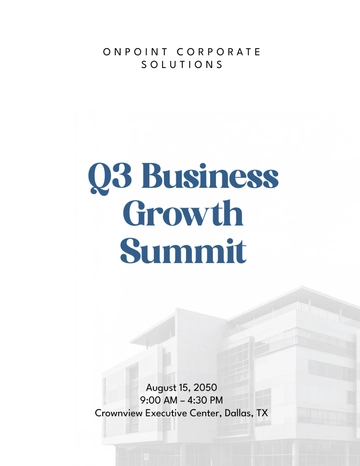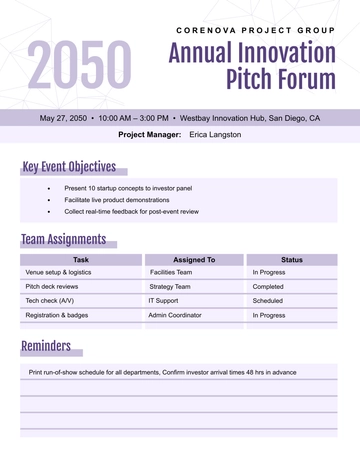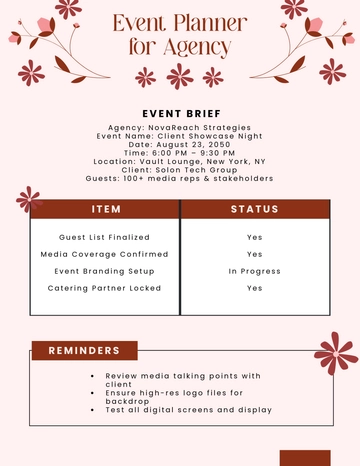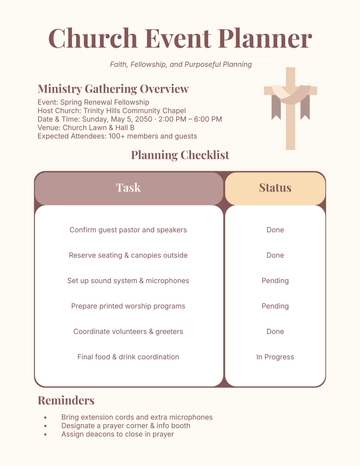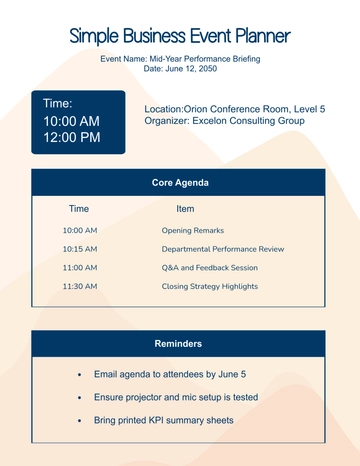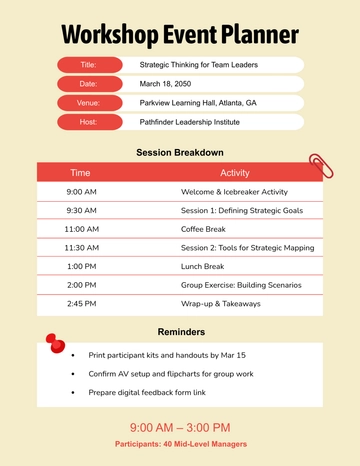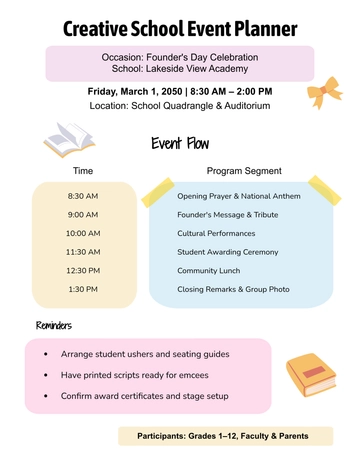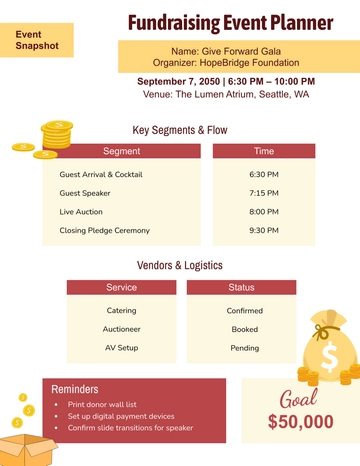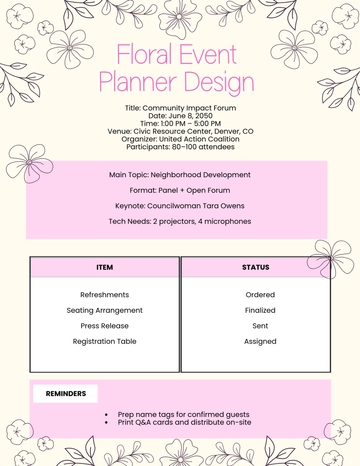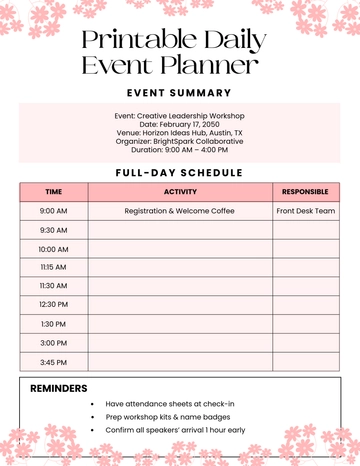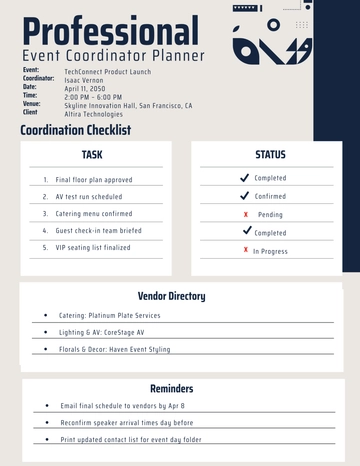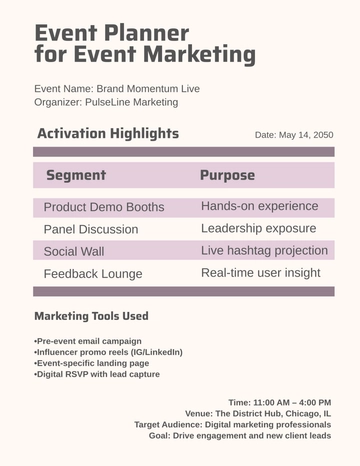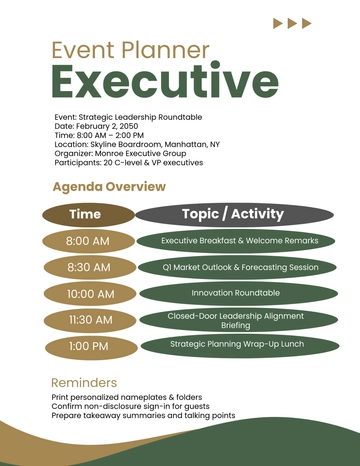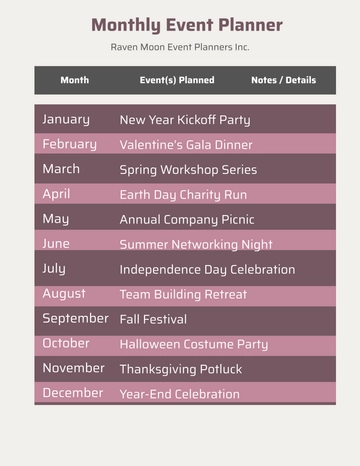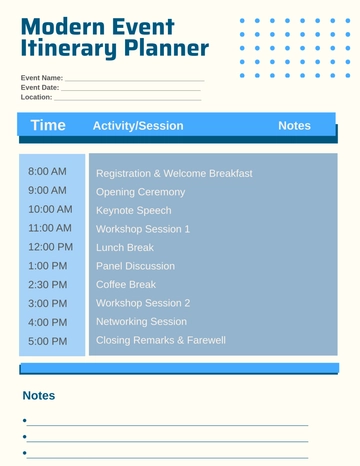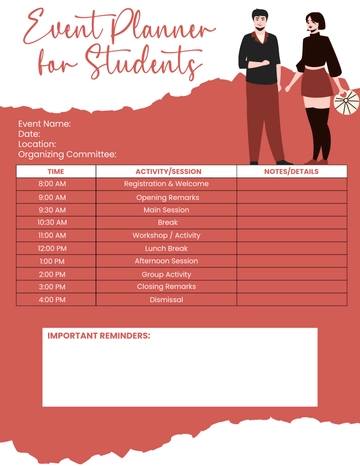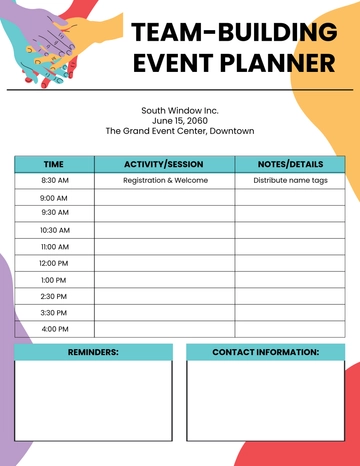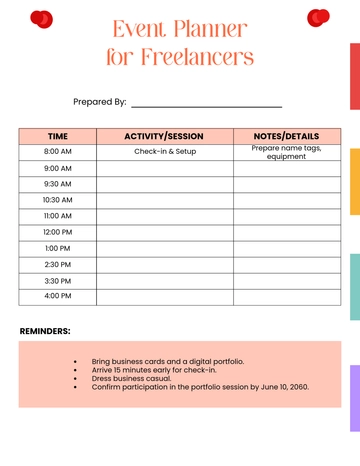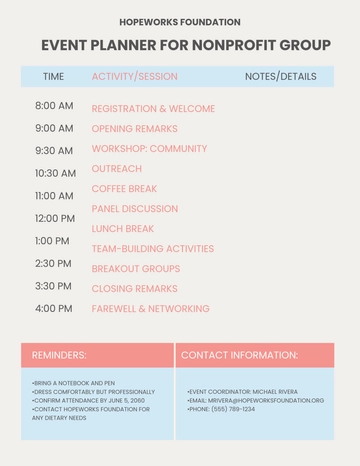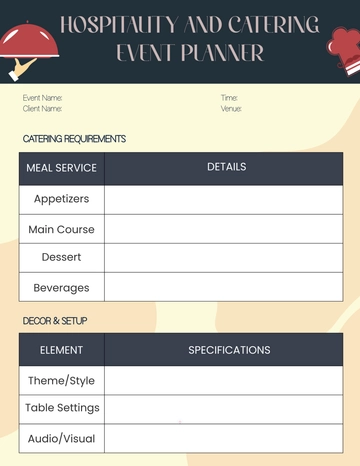Free Event Planner Transportation Plan
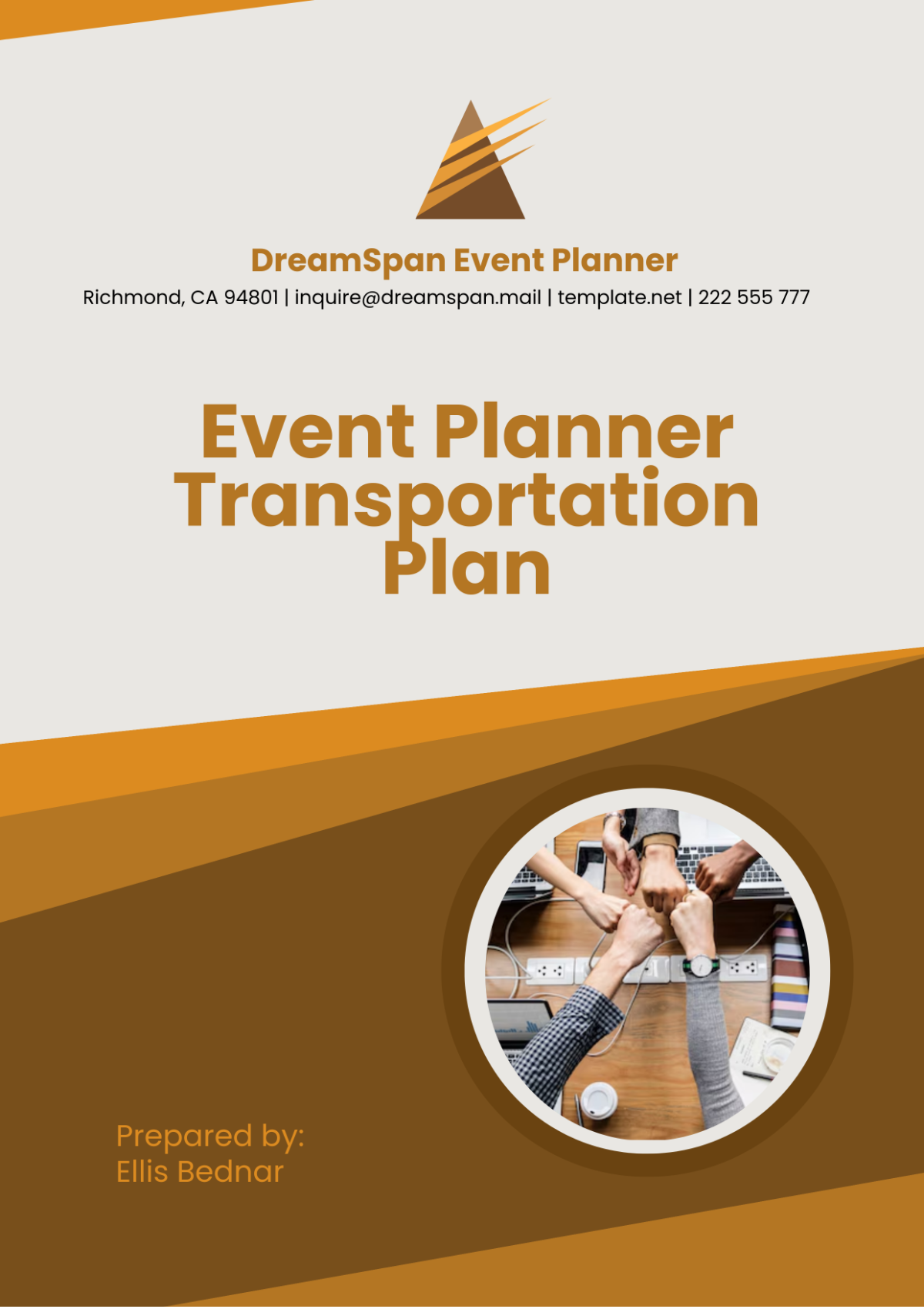
1. Introduction
1.1 Purpose of the Transportation Plan
The Transportation Plan serves as a comprehensive guide for managing the logistical aspects of transportation for events organized by [Your Company Name]. It outlines the methods and strategies required to ensure smooth transportation for attendees, staff, and vendors. The plan emphasizes efficiency, safety, and cost-effectiveness while also considering the environmental impact of transportation choices. By providing detailed protocols and guidelines, this plan aims to minimize transportation-related stress and enhance the overall attendee experience.
1.2 Scope of the Plan
This plan covers all transportation-related activities for events scheduled from the year [2050] and onwards. It includes detailed assessments of transportation needs, logistics, schedules, and evaluation metrics to ensure a seamless experience for all participants involved. The scope encompasses a variety of transportation modes, including shuttle services, local transport arrangements, and emergency services. It also addresses the specific requirements for different types of events, whether they are large conferences, intimate seminars, or festive gatherings. The dynamic nature of our events necessitates a flexible transportation plan that can adapt to varying attendee numbers and venue locations.
1.3 Goals and Objectives
The primary goals of the Transportation Plan are as follows:
Ensure reliable and timely transportation for all attendees, minimizing wait times and maximizing convenience.
Minimize transportation costs while maximizing efficiency, using budget-friendly options without compromising service quality.
Provide comprehensive accessibility options for all attendees, ensuring inclusivity for individuals with different mobility needs.
Implement sustainable transportation practices where possible, such as promoting carpooling, using eco-friendly vehicles, and reducing overall carbon emissions.
Gather feedback to continuously improve transportation services for future events, fostering an environment of continuous improvement and responsiveness to attendee needs.
2. Event Overview
2.1 Event Description
[Your Company Name] organizes various events throughout the year, including conferences, trade shows, and seminars. Each event will require a specific transportation plan tailored to its unique requirements. This section will focus on a hypothetical annual conference that will take place in [2050]. The conference will feature a wide array of sessions, including keynote speeches from industry leaders, panel discussions, networking opportunities, and workshops aimed at enhancing professional skills. By focusing on relevant themes and topics, the conference aims to engage attendees in meaningful discussions and foster valuable connections.
2.2 Event Dates and Duration
The annual conference is scheduled for [May 15-17, 2050]. The event will span three days, including keynote speeches, breakout sessions, networking opportunities, and social events. Each day will feature a packed agenda, designed to maximize learning and engagement. The conference will conclude with a gala dinner on the final evening, allowing attendees to unwind and celebrate their participation. This extended duration will provide ample time for networking and collaboration among participants.
2.3 Expected Attendance
Anticipated attendance for the conference is approximately [1,500] participants, including speakers, exhibitors, and attendees. This number will influence transportation logistics, as multiple transportation options will need to accommodate a large influx of people. With such a diverse group, it is crucial to understand the demographics of the attendees, as they may vary from industry professionals to students and community members. This variety will require us to provide a range of transportation options tailored to different needs and preferences.
3. Transportation Needs Assessment
3.1 Types of Transportation Required
The transportation plan must accommodate various modes of transportation to cater to the diverse needs of attendees. The following types of transportation will be utilized:
Airport Transfers: Shuttle services from major airports to the event venue will ensure that attendees can easily reach the conference without the hassle of navigating public transportation.
Local Transportation: Buses, taxis, or rideshare services for attendees traveling within the city will be arranged to allow easy movement between hotels, the venue, and other attractions. This will help attendees explore the local area during their downtime.
On-Site Transportation: Shuttle services between different venues during the event will ensure that participants can easily transition between various session locations without losing time.
3.2 Transportation Providers
[Your Company Name] will collaborate with reputable transportation providers to ensure quality and reliability. A list of potential providers is included in Appendix 10.1. Factors considered in selecting providers include:
Reputation and Reliability: Partnering with established companies that have a proven track record in event transportation is vital for ensuring smooth operations.
Availability of Vehicles and Services: Providers must have a sufficient fleet of vehicles to accommodate the expected number of attendees, including options for larger groups as needed.
Cost-Effectiveness: Budget constraints necessitate a careful analysis of costs, with an emphasis on maximizing value without sacrificing service quality.
Compliance with Safety Regulations: All transportation providers must adhere to local and national safety standards to ensure the well-being of all participants.
3.3 Cost Estimates
A preliminary budget for transportation costs is outlined in Table 1. This budget includes estimates for each type of transportation needed for the event. By establishing a clear financial framework, we can better manage expenses and allocate resources effectively.
Transportation Type | Estimated Cost (Total) | Description |
|---|---|---|
Airport Transfers | $[15,000] | Shuttle services for arrivals and departures, ensuring timely transfers for all attendees. |
Local Transportation | $[10,000] | Buses and rideshare reimbursements to facilitate easy travel within the city. |
On-Site Transportation | $[8,000] | Shuttle services running throughout the event to connect different venues efficiently. |
Total | $[33,000] | Total estimated transportation cost for the event, providing a solid foundation for budgeting. |
4. Transportation Logistics
4.1 Arrival and Departure Logistics
Arrival and departure logistics will be planned in advance to streamline the check-in process for attendees. This will involve:
Scheduling airport transfers to align with flight arrivals and departures, ensuring that shuttles are available when needed.
Communicating schedules to attendees ahead of time through email and the event website, allowing participants to plan their travel accordingly.
Coordinating with local hotels to provide shuttle services for their guests, further easing transportation concerns and enhancing attendee satisfaction.
4.2 On-Site Transportation Management
Effective management of on-site transportation is crucial for ensuring a smooth experience. Key strategies will include:
Designating a Transportation Coordinator to oversee logistics and address issues as they arise, ensuring that any concerns are dealt with promptly.
Implementing a transportation hub at the event venue where shuttles and other transportation options can be easily accessed by attendees, providing a central point for inquiries and assistance.
Providing signage and staff assistance to guide attendees, making it easier for them to navigate the venue and locate transportation options.
4.3 Emergency Transportation Plan
An emergency transportation plan will be developed to address any unforeseen circumstances that may affect transportation services. This plan will include:
Backup transportation providers on standby in case of vehicle breakdowns or delays, ensuring that attendees are never left without options.
Clear communication channels for staff and attendees to report issues, fostering an environment of transparency and responsiveness.
A protocol for handling medical emergencies, including quick access to local medical facilities, ensuring the safety and well-being of all participants.
5. Transportation Schedule
5.1 Daily Transportation Schedule
A detailed daily transportation schedule will be created to outline when and where transportation services will be available. This schedule will include:
Shuttle timings for airport transfers, clearly delineating pick-up and drop-off times.
Local transportation availability throughout the event, ensuring that attendees can easily access various locations.
Scheduled runs for on-site shuttles between venues, minimizing wait times and maximizing convenience.
5.2 Timelines for Each Transportation Type
Timelines for each type of transportation are crucial for planning. Below is a sample timeline for Day 1 of the event:
Time | Transportation Type | Description |
|---|---|---|
7:00 AM - 9:00 AM | Airport Transfers | Shuttle service from [City Airport] to venue, ensuring timely arrivals for attendees. |
9:30 AM - 10:00 AM | Local Transportation | Shuttle to hotel for late arrivals, accommodating guests arriving later in the morning. |
10:00 AM - 5:00 PM | On-Site Transportation | Continuous shuttle service between breakout session locations to facilitate attendee movement. |
6:00 PM - 8:00 PM | Evening Networking Event | Shuttle service to dinner venue, allowing attendees to enjoy local cuisine and network. |
6. Accessibility Considerations
6.1 ADA Compliance
Ensuring ADA compliance is vital for providing equal access to all attendees. This includes:
Evaluating transportation options to ensure they are accessible for individuals with mobility impairments, including the availability of wheelchair-accessible vehicles.
Providing clear information about accessibility features of all transportation services on the event website and in attendee materials, helping to foster a welcoming environment.
Training transportation staff on best practices for assisting individuals with disabilities, ensuring that all participants feel comfortable and supported during their travels.
6.2 Transportation for Special Needs
Special transportation arrangements will be made for attendees with specific needs. These arrangements may include:
Identifying and booking specialized transportation services that cater specifically to attendees with disabilities, ensuring their travel needs are met with respect and care.
Creating a reservation system that allows attendees to request special accommodations in advance, making it easier to plan for their transportation needs.
Establishing a dedicated hotline for inquiries about accessible transportation, ensuring that attendees have a clear channel for communication regarding their unique needs.
7. Communication Plan
7.1 Stakeholder Communication
Effective communication with all stakeholders is essential for the success of the transportation plan. Key stakeholders include:
Event attendees: Regular updates will be communicated through email newsletters and the event website, ensuring participants are well-informed about transportation options, schedules, and any changes.
Transportation providers: Maintaining open lines of communication with all transportation partners to ensure they are aware of schedules, requirements, and any potential changes or emergencies that may arise during the event.
Event staff: Regular briefings and updates will be held to ensure all staff are aware of the transportation plan and their roles within it, facilitating a coordinated approach to managing transportation.
7.2 Transportation Updates for Attendees
Timely updates regarding transportation will be shared with attendees to ensure they have the latest information. This includes:
Real-time updates via a dedicated event app that provides information on shuttle arrival times, delays, and route changes, helping attendees stay informed while on the go.
Text alerts for last-minute changes in transportation schedules or services, ensuring participants can quickly adjust their plans if necessary.
Visual aids at the venue, such as digital screens displaying transportation schedules and updates, ensuring that attendees can easily access information during the event.
8. Monitoring and Evaluation
8.1 Performance Metrics
Establishing performance metrics is vital for assessing the success of the transportation plan. Metrics to be monitored include:
Timeliness of transportation services: Evaluating whether shuttles and other transportation services meet scheduled departure and arrival times, helping to identify any areas for improvement.
Attendee satisfaction surveys: Conducting surveys post-event to gather feedback regarding the transportation services provided, ensuring that attendees can share their experiences and suggestions for improvement.
Cost analysis: Reviewing the overall transportation budget against actual expenses to assess the cost-effectiveness of the transportation plan, identifying potential savings or areas for better resource allocation.
8.2 Post-Event Review
A comprehensive post-event review will be conducted to evaluate the transportation plan's effectiveness. This review will involve:
Analyzing feedback collected from attendees and staff, identifying strengths and areas for improvement for future events.
Meeting with transportation providers to discuss performance and any challenges encountered, ensuring that lessons learned are applied to future partnerships.
Documenting best practices and key learnings to enhance future transportation plans and ensure continuous improvement in service delivery.
9. Conclusion
The Transportation Plan for [Your Company Name] is designed to facilitate a seamless experience for all participants attending events in [2050] and beyond. By meticulously planning transportation logistics, ensuring accessibility, and maintaining open communication with all stakeholders, we aim to enhance attendee satisfaction while ensuring their safety and convenience. This comprehensive plan not only addresses current transportation needs but also sets a foundation for continuous improvement, allowing [Your Company Name] to adapt to evolving trends and participant expectations in the years to come.
- 100% Customizable, free editor
- Access 1 Million+ Templates, photo’s & graphics
- Download or share as a template
- Click and replace photos, graphics, text, backgrounds
- Resize, crop, AI write & more
- Access advanced editor
Organize transport logistics with the Event Planner Transportation Plan Template from Template.net. This editable and customizable template details schedules, routes, and vehicle information. Customize it in our Ai Editor Tool for efficient event transportation.
You may also like
- Aesthetic Planner
- Hourly Planner
- Daily Planner
- Weekly Planner
- Monthly Planner
- Planners Yearly
- Event Planner
- Project Planner
- Calendar Planner
- Student Planner
- School Planner
- Teacher Planner
- Kawaii Planner
- Budget Planner
- Life Planner
- Meal Planner
- Study Planner
- Business
- Workout Planner
- Work Schedule Planner
- Party Planner
- Social Media Planner
- Baby Shower Planner
- Book Planner
- Planner Cover
- Debt Planner
- Desk Planner
- Diet Planner
- Family Planner
- Fitness Planner
- Goal Planner
- Health Planner
- Medical Planner
- Holiday Planner
- Homework Planner
- Itinerary Planner
- Journal Planner
- Personal Planner
- Route Planner
- Smart Goal Planner
- Travel Planner
- Wedding Planeer
